|
|
|
Sort Order |
|
|
|
Items / Page
|
|
|
|
|
|
|
| Srl | Item |
| 1 |
ID:
095206
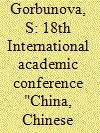

|
|
|
|
|
| Publication |
2010.
|
| Summary/Abstract |
The 18th International Academic Conference "China, Chinese Civilization and the World: History, the Present, Prospects" was held in Moscow at the RAS Presidium and the Institute for Far Eastern Studies. It was timed to two major historical events: the 60th anniversary of the formation of the PRC and the 60th anniversary of the establishment of diplomatic relations between the U.S.S.R./RF and the PRC.
|
|
|
|
|
|
|
|
|
|
|
|
|
|
|
|
| 2 |
ID:
110142
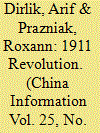

|
|
|
|
|
| Publication |
2011.
|
| Summary/Abstract |
The 1911 Revolution was a momentous event in bringing down the monarchical institution with a history of 2,000 years. Yet its consequences were ambiguous, it was overshadowed by the more radical revolution that followed in 1949, and it was stigmatized by the defeat of the Kuomintang, which claimed it as its own. Its 'revolutionariness' has been in question even as it has been celebrated as a turning point in modern Chinese history. This discussion reaffirms the revolutionary significance of the event, but also suggests that it is best viewed as a 'high peak' in a revolution of long duration that is yet to be completed. The current regime in China has revived aspects of monarchical culture and practices that revolutionaries sought to abolish in 1911. Most importantly, the promise of full citizenship for all that animated the 1911 Revolution remains unfulfilled, which may explain the contemporary regime's nervousness over the celebration of its 100th anniversary.
|
|
|
|
|
|
|
|
|
|
|
|
|
|
|
|
| 3 |
ID:
120819
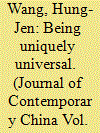

|
|
|
|
|
| Publication |
2013.
|
| Summary/Abstract |
In this paper I address the question of how Chinese scholars participate in scientific knowledge production by appropriating Western IR theories, primarily by examining interactions between North American theories that claim universality and China-specific IR efforts. Drawing on post-Mao era publications and books, I discuss how increasingly independent Chinese IR scholars are portraying their country's rising status in international politics and identifying China's national interests, while still emphasizing socialist concepts such as anti-hegemonism. The result is a form of Chinese IR scholarship that combines Western IR language with a worldview that emphasizes a modern China within the context of traditional socialist foreign policy norms. I will argue that Chinese scholarly discussions about IR theory building reflect efforts to present 'their rising China' (as individually perceived) in the study, research, and development of IR theory in response to the appearance of modern IR methods that require new definitions and new roles for old socialist forms. In this context, identity concerns are more important than the actual theories being established or appropriated.
|
|
|
|
|
|
|
|
|
|
|
|
|
|
|
|
| 4 |
ID:
123233
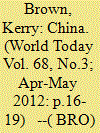

|
|
|
| 5 |
ID:
160511
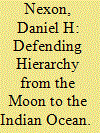

|
|
|
|
|
| Summary/Abstract |
Why do leading actors invest in costly projects that they expect will not yield appreciable military or economic benefits? We identify a causal process in which concerns about legitimacy produce attempts to secure dominance in arenas of high symbolic value by investing wealth and labor into unproductive (in direct military and economic terms) goods and performances. We provide evidence for our claims through a comparative study of the American Project Apollo and the Ming Dynasty's treasure fleets. We locate our argument within a broader constructivist and practice-theoretic understanding of hierarchy and hegemony. We build on claims that world politics is a sphere of complex social stratification by viewing constituent hierarchies in terms of social fields. Our specific theory and broader framework, we contend, provide tools for understanding the workings of power politics beyond military and economic competition.
|
|
|
|
|
|
|
|
|
|
|
|
|
|
|
|
| 6 |
ID:
120799
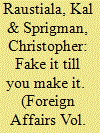

|
|
|
|
|
| Publication |
2013.
|
| Summary/Abstract |
Given that Chinese counterfeiting has benefits as well as costs, and considering China's historical resistance to Western pressure, trying to push China to change its approach to intellectual property law is not worth the political and diplomatic capital the United States is spending on it.
|
|
|
|
|
|
|
|
|
|
|
|
|
|
|
|
| 7 |
ID:
189892
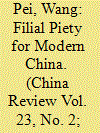

|
|
|
|
|
| Summary/Abstract |
Filial piety is a central virtue of Confucian ethics and widely viewed as an important part of what it means to be(come) Chinese. Confucian scholars emphasize the cultivation of filial piety (love and respect for parents) while assuming that parental love for children is innate. But this traditional view has led to the deformation of filial piety and twisted requests for parental love in both past and present-day China. In contrast, I will argue that long-lasting parental love also requires moral effort to become a virtue and that filial piety for the modern world cannot be morally justified without this form of parental love.
|
|
|
|
|
|
|
|
|
|
|
|
|
|
|
|
| 8 |
ID:
124269
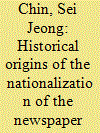

|
|
|
|
|
| Publication |
2013.
|
| Summary/Abstract |
This paper explores the reasons behind the relative success of the CCP's direct control over the news media in the early 1950s. Despite its importance in understanding the rise of depotism during the Mao era, the nationalization of the newspapers has not been fully studied. Building upon the recent studies emphasizing the adaptive nature of the CCP, this study analyzes the ownership transformation of the Shanghai newspapers from the 1930s to the early 1950s by going beyond the 1949 divide. I argue that the CCP's relative success in.
|
|
|
|
|
|
|
|
|
|
|
|
|
|
|
|
| 9 |
ID:
087773
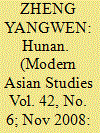

|
|
|
|
|
| Publication |
2008.
|
| Summary/Abstract |
Hunan produced the largest number and most able leaders for the Chinese Communist Party. How could this land-locked, sleepy and conservative province produce so many revolutionaries? This article examines the consequences of three consecutive political theatres and their actors that turned Hunan into a laboratory of reform and land of revolution. It focuses on what three generations of Hunanese did that pushed Hunan into and kept the province in the national spotlight. The Hunanese, be they Qing loyalists, constitutional reformers, Han nationalists or communists, dominated China's political stage from the 1850s to the 1980s. They were patriotic and pragmatic in their patriotism. Would the Communist Revolution have been so fundamental and bloody had Champagne liberals or those with no militarist tradition controlled the helm? With the tide of Hunan gone, we must re-examine this province to see how it had shaped and changed the course of modern China.
|
|
|
|
|
|
|
|
|
|
|
|
|
|
|
|
| 10 |
ID:
135021
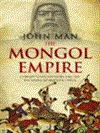

|
|
|
|
|
| Publication |
London, Bantam Press, 2014.
|
| Description |
xii, 384p.Pbk
|
| Standard Number |
9780593071250
|
|
|
|
|
|
|
|
|
|
|
|
Copies: C:1/I:0,R:0,Q:0
Circulation
| Accession# | Call# | Current Location | Status | Policy | Location |
| 057953 | 951.7/MAN 057953 | Main | On Shelf | General | |
|
|
|
|
| 11 |
ID:
029764
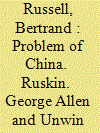

|
|
|
|
|
| Publication |
Ruskin, George Allen and Unwin Ltd., 1966.
|
| Description |
260p.hbk
|
|
|
|
|
|
|
|
|
|
|
|
Copies: C:1/I:0,R:0,Q:0
Circulation
| Accession# | Call# | Current Location | Status | Policy | Location |
| 001171 | 951.041/RUS 001171 | Main | On Shelf | General | |
|
|
|
|
| 12 |
ID:
123304
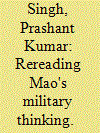

|
|
|
|
|
| Publication |
2013.
|
| Summary/Abstract |
Although the nature of warfare has changed beyond recognition since the 1920s and 1930s when Chairman Mao Zedong penned his main military writings, his military thoughts are still a point of reference for any discussion on military thinking in modern China. Developments in warfare have superseded Mao's operational principles and tactics visualised in his three-stage warfare; however, his philosophical and political understanding of war has value that transcends time and space. The present article shows that the political and military situation in China in the 1920s and 1930s shaped Mao's military thoughts, and his military ideas were an original contribution to Marxist thought. The extent to which pre-existing non-Marxist Chinese and Western scholarly traditions of strategic thinking influenced his ideas is uncertain. Mao's military ideas continue to provide normative direction in China, with the potential of opportunistic philosophical manipulation by the government. In addition, the righteous convictions of his military thoughts continue to capture the imagination of anti-system dissenters worldwide.
|
|
|
|
|
|
|
|
|
|
|
|
|
|
|
|
| 13 |
ID:
139668
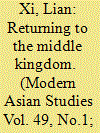

|
|
|
|
|
| Summary/Abstract |
This article re-examines the frustrated Westernizing efforts of Yung Wing and the recalled students of the Chinese Educational Mission to the United States (1872–1881). It does so in response to recent scholarship (in both the Chinese and the English languages) which affirms the ‘transformative role’ of the returnees in late Qing reform and modernization. On the basis of a variety of sources, this article suggests, instead, that for those patriotic students returning to the Middle Kingdom, eager to bring about a fundamental change in its political system and rejuvenation of its civilization, disillusionment was often inevitable, and the choice—short of revolution—became one of either marginalization or co-option by the autocratic state. Despite all their achievements, China’s earliest students of the West ultimately failed to set the country upon a new modernizing course—a failure that pointed, beyond itself, to an emerging (and subsequently persistent) pattern in the troubled relationship between the new, Westernized elite and the state in modern China.
|
|
|
|
|
|
|
|
|
|
|
|
|
|
|
|
| 14 |
ID:
085883
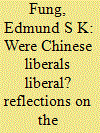

|
|
|
|
|
| Publication |
2009.
|
| Summary/Abstract |
In Chinese scholarship over the past ten years or so, it is often thought that the intellectuals of modern China misunderstood liberalism, and even distorted it, because they failed to recognize classical liberalism,especially the link between liberalism and a free market economy.
|
|
|
|
|
|
|
|
|
|
|
|
|
|
|
|
|
|
|
|
|